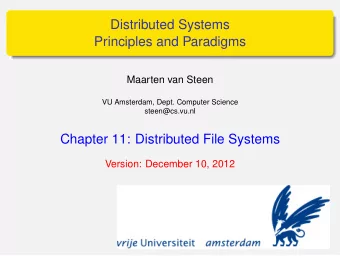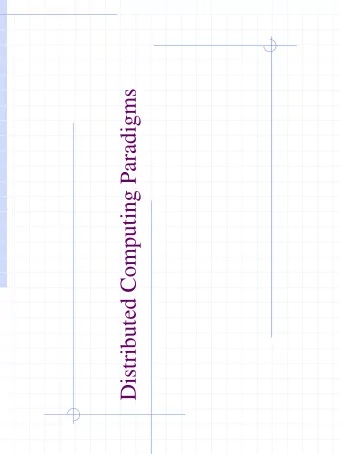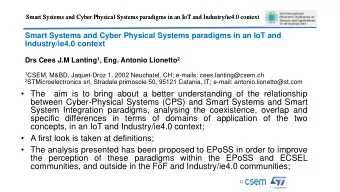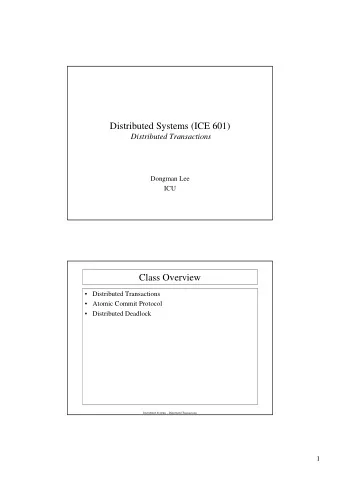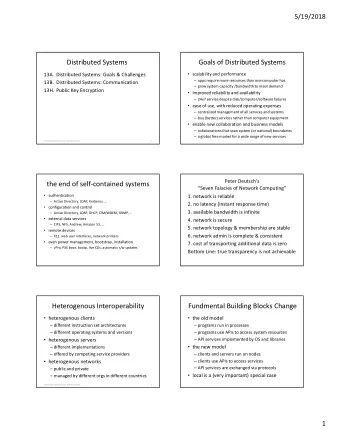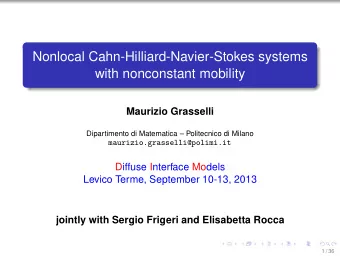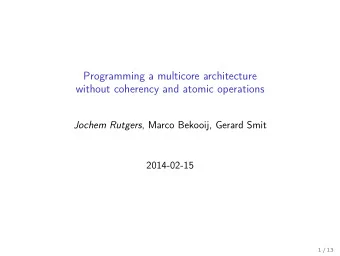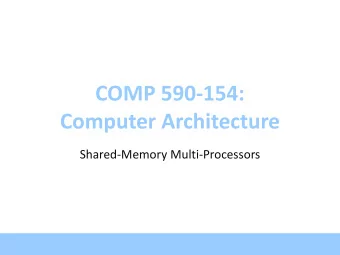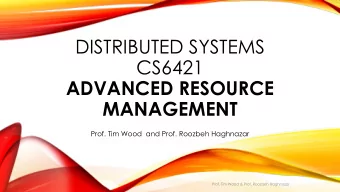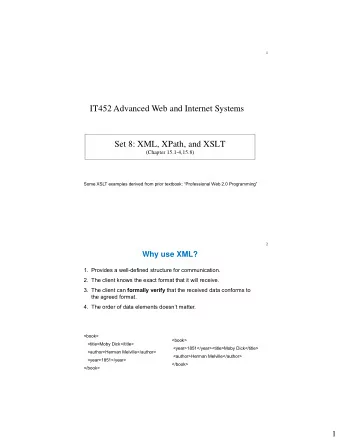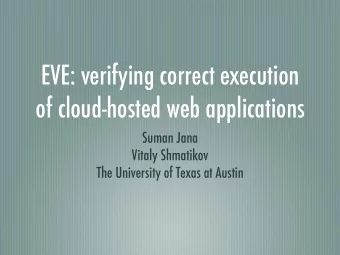
Distributed Systems Principles and Paradigms Maarten van Steen VU - PowerPoint PPT Presentation
Distributed Systems Principles and Paradigms Maarten van Steen VU Amsterdam, Dept. Computer Science Room R4.20, steen@cs.vu.nl Chapter 03: Processes Version: November 3, 2010 Contents Chapter 01: Introduction 02: Architectures 03:
Distributed Systems Principles and Paradigms Maarten van Steen VU Amsterdam, Dept. Computer Science Room R4.20, steen@cs.vu.nl Chapter 03: Processes Version: November 3, 2010
Contents Chapter 01: Introduction 02: Architectures 03: Processes 04: Communication 05: Naming 06: Synchronization 07: Consistency & Replication 08: Fault Tolerance 09: Security 10: Distributed Object-Based Systems 11: Distributed File Systems 12: Distributed Web-Based Systems 13: Distributed Coordination-Based Systems 2 / 38
Processes 3.1 Threads Introduction to Threads Basic idea We build virtual processors in software, on top of physical processors: Processor: Provides a set of instructions along with the capability of automatically executing a series of those instructions. Thread: A minimal software processor in whose context a series of instructions can be executed. Saving a thread context implies stopping the current execution and saving all the data needed to continue the execution at a later stage. Process: A software processor in whose context one or more threads may be executed. Executing a thread, means executing a series of instructions in the context of that thread. 3 / 38
Processes 3.1 Threads Context Switching Contexts Processor context: The minimal collection of values stored in the registers of a processor used for the execution of a series of instructions (e.g., stack pointer, addressing registers, program counter). Thread context: The minimal collection of values stored in registers and memory, used for the execution of a series of instructions (i.e., processor context, state). Process context: The minimal collection of values stored in registers and memory, used for the execution of a thread (i.e., thread context, but now also at least MMU register values). 4 / 38
Processes 3.1 Threads Context Switching Contexts Processor context: The minimal collection of values stored in the registers of a processor used for the execution of a series of instructions (e.g., stack pointer, addressing registers, program counter). Thread context: The minimal collection of values stored in registers and memory, used for the execution of a series of instructions (i.e., processor context, state). Process context: The minimal collection of values stored in registers and memory, used for the execution of a thread (i.e., thread context, but now also at least MMU register values). 4 / 38
Processes 3.1 Threads Context Switching Contexts Processor context: The minimal collection of values stored in the registers of a processor used for the execution of a series of instructions (e.g., stack pointer, addressing registers, program counter). Thread context: The minimal collection of values stored in registers and memory, used for the execution of a series of instructions (i.e., processor context, state). Process context: The minimal collection of values stored in registers and memory, used for the execution of a thread (i.e., thread context, but now also at least MMU register values). 4 / 38
Processes 3.1 Threads Context Switching Observations Threads share the same address space. Thread context switching 1 can be done entirely independent of the operating system. Process switching is generally more expensive as it involves 2 getting the OS in the loop, i.e., trapping to the kernel. Creating and destroying threads is much cheaper than doing so 3 for processes. 5 / 38
Processes 3.1 Threads Threads and Operating Systems Main issue Should an OS kernel provide threads, or should they be implemented as user-level packages? User-space solution All operations can be completely handled within a single process ⇒ implementations can be extremely efficient. All services provided by the kernel are done on behalf of the process in which a thread resides ⇒ if the kernel decides to block a thread, the entire process will be blocked. Threads are used when there are lots of external events: threads block on a per-event basis ⇒ if the kernel can’t distinguish threads, how can it support signaling events to them? 6 / 38
Processes 3.1 Threads Threads and Operating Systems Kernel solution The whole idea is to have the kernel contain the implementation of a thread package. This means that all operations return as system calls Operations that block a thread are no longer a problem: the kernel schedules another available thread within the same process. Handling external events is simple: the kernel (which catches all events) schedules the thread associated with the event. The big problem is the loss of efficiency due to the fact that each thread operation requires a trap to the kernel. Conclusion Try to mix user-level and kernel-level threads into a single concept. 7 / 38
Processes 3.1 Threads Solaris Threads Basic idea Introduce a two-level threading approach: lightweight processes that can execute user-level threads. Thread state User space Thread Lightweight process Kernel space LWP executing a thread 8 / 38
Processes 3.1 Threads Solaris Threads Principal operation User-level thread does system call ⇒ the LWP that is executing that thread, blocks. The thread remains bound to the LWP . The kernel can schedule another LWP having a runnable thread bound to it. Note: this thread can switch to any other runnable thread currently in user space. A thread calls a blocking user-level operation ⇒ do context switch to a runnable thread, (then bound to the same LWP). When there are no threads to schedule, an LWP may remain idle, and may even be removed (destroyed) by the kernel. Note This concept has been virtually abandoned – it’s just either user-level or kernel-level threads. 9 / 38
Processes 3.1 Threads Solaris Threads Principal operation User-level thread does system call ⇒ the LWP that is executing that thread, blocks. The thread remains bound to the LWP . The kernel can schedule another LWP having a runnable thread bound to it. Note: this thread can switch to any other runnable thread currently in user space. A thread calls a blocking user-level operation ⇒ do context switch to a runnable thread, (then bound to the same LWP). When there are no threads to schedule, an LWP may remain idle, and may even be removed (destroyed) by the kernel. Note This concept has been virtually abandoned – it’s just either user-level or kernel-level threads. 9 / 38
Processes 3.1 Threads Solaris Threads Principal operation User-level thread does system call ⇒ the LWP that is executing that thread, blocks. The thread remains bound to the LWP . The kernel can schedule another LWP having a runnable thread bound to it. Note: this thread can switch to any other runnable thread currently in user space. A thread calls a blocking user-level operation ⇒ do context switch to a runnable thread, (then bound to the same LWP). When there are no threads to schedule, an LWP may remain idle, and may even be removed (destroyed) by the kernel. Note This concept has been virtually abandoned – it’s just either user-level or kernel-level threads. 9 / 38
Processes 3.1 Threads Solaris Threads Principal operation User-level thread does system call ⇒ the LWP that is executing that thread, blocks. The thread remains bound to the LWP . The kernel can schedule another LWP having a runnable thread bound to it. Note: this thread can switch to any other runnable thread currently in user space. A thread calls a blocking user-level operation ⇒ do context switch to a runnable thread, (then bound to the same LWP). When there are no threads to schedule, an LWP may remain idle, and may even be removed (destroyed) by the kernel. Note This concept has been virtually abandoned – it’s just either user-level or kernel-level threads. 9 / 38
Processes 3.1 Threads Solaris Threads Principal operation User-level thread does system call ⇒ the LWP that is executing that thread, blocks. The thread remains bound to the LWP . The kernel can schedule another LWP having a runnable thread bound to it. Note: this thread can switch to any other runnable thread currently in user space. A thread calls a blocking user-level operation ⇒ do context switch to a runnable thread, (then bound to the same LWP). When there are no threads to schedule, an LWP may remain idle, and may even be removed (destroyed) by the kernel. Note This concept has been virtually abandoned – it’s just either user-level or kernel-level threads. 9 / 38
Processes 3.1 Threads Solaris Threads Principal operation User-level thread does system call ⇒ the LWP that is executing that thread, blocks. The thread remains bound to the LWP . The kernel can schedule another LWP having a runnable thread bound to it. Note: this thread can switch to any other runnable thread currently in user space. A thread calls a blocking user-level operation ⇒ do context switch to a runnable thread, (then bound to the same LWP). When there are no threads to schedule, an LWP may remain idle, and may even be removed (destroyed) by the kernel. Note This concept has been virtually abandoned – it’s just either user-level or kernel-level threads. 9 / 38
Recommend
More recommend
Explore More Topics
Stay informed with curated content and fresh updates.
